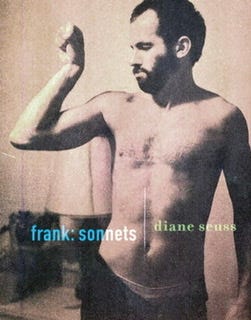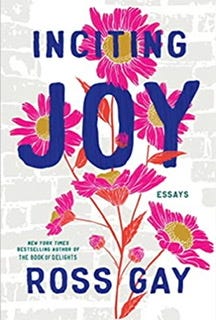Yes, the year isn’t over yet, and yes, I’m currently reading a book that might have made this list (The Other Name by Jon Fosse, translated by Damion Searls), but I’m going to be traveling soon, so now is the time for a round-up of my favorite books of year. Here you go, in no particular order:
The Second Body by Daisy Hildyard (Fitzcarraldo Editions, 2018): I’m still thinking about this book, which I wrote about back in February. It made me think about identity, the body, climate, and our place in time and space in a new way. I’ve been reading a lot about ways of imagining the interconnectedness of humanity, and I think this is an essential book in that area. It’s also a pleasure to read — not an easy topic, to be clear, but Hildyard’s writing is a joy to sit with.
Elena Knows by Claudia Piñeiro, translated by Frances Riddle (Charco Press, 2021): I wrote about this book in March. Piñeiro gets you into the mind and body of a woman with Parkinson’s disease, or at least it feels like she does. It’s a complicated experience: you root for her as she sets out on a quest that will take everything she has and more, but you also learn that she’s a difficult, disagreeable, and maybe even nasty woman, and you don’t know quite what to think. I loved the complexity of the characters, as well as the social issues that emerge as the plot moves along.
Panthers and the Museum of Fire by Jen Craig (Zerogram Press, 2021) and Emily Hall’s The Longcut (Dalkey Archive Press, 2022): I wrote about the Jen Craig book in March. I do love a book about walking! Both of these books are set in cities, Sydney in Craig’s case and New York City in Hall’s. The protagonists are both thinking through a problem about their art as they walk, what made their writing stall and then start again in one case, and, in the other, what the very nature of their art is and what kind of artist they want to be. I tried to pick one of these books as a favorite and couldn’t, so just read them both. Both writers have developed a voice that is distinctive, entertaining, complex, and companionable.
Woman Running in the Mountains by Yuko Tsushima, translated by Geraldine Harcourt (NYRB, 2022; originally published in 1980): Frances, Dorian, and I discussed this novel for our April episode of One Bright Book. There’s something so warm and open about Tsushima’s writing; perhaps I feel this way because she writes about light so beautifully, especially in Territory of Light, which I reread this year. Tsushima’s characters struggle — with work, money, raising children, and, most significantly, patriarchy — but they also move toward possibility and change, and I love the slow but steady way they remake their lives.
Black Paper: Writing in a Dark Time by Teju Cole (University of Chicago Press, 2021): Not enough people have read this book! Teju Cole is doing some of the most interesting writing out there — I love the way he’s publishing with small presses and doing weird experimental work these days. Don’t let Open City by the last Teju Cole you read. Black Paper is an essay collection about art in its social and political context. Cole thinks about ethics and aesthetics in complex and profound ways — he’s a beautiful writer and a convicting one.
Lolly Willowes by Sylvia Townsend Warner (NYRB 1999; originally published in 1926): I did not expect to love Lolly Willowes when Frances picked it for the June episode of One Bright Book — I hadn’t liked Warner’s Summer Will Show when I read it years ago — but I was so wrong. This tale of a 47-year-old “maiden aunt” who — well, read this book without knowing anything about it if you can — remakes her life is so fun, so strange, so surprising, I adored it. It wins the prize for the weirdest narrative journey I’ve read in a long time.
Blackfishing the IUD by Caren Beilin (Wolfman Books, 2019): I read a couple nonfiction books about illness in 2022; both were good, but this stands out for its intensity, power, and strangeness (the other was Ill Feelings by Alice Hattrick, which WAS very good!). Blackfishing the IUD is part personal narrative, part meditation on medicine, justice, and gender. The ideas it explores are important — the book taught me a lot — but Beilin’s writing is what stands out to me. It’s consistently surprising, lively, poetic, and weird. The book is a very generous one too, a thing I love.
Happening by Annie Ernaux, translated by Tanya Leslie (Seven Stories Press, 2019, originally published in 2000): What a year for Annie Ernaux! I’m just sorry I only began reading her in 2020. I have some catching up to do. Happening is the most powerful Ernaux I’ve read so far, although A Girl’s Story may remain my favorite. Happening is an utterly harrowing account of Ernaux’s illegal abortion 1963. Ernaux descriptions are unsparing and she captures her panic and despair so well. It’s a difficult but brilliant and necessary book.
A Horse at Night: On Writing by Amina Cain (Dorothy Project, 2022): This book’s subtitle makes the most sense when you think of it as both “on being a writer” and “on reading the writing of others” because it’s as much a reader’s journal as anything else. It’s a collection of short pieces on aspects of writing you don’t come across in similar books: darkness, friendship, solitude, animals, writing as painting. It’s a beautiful, meditative, generous invitation to contemplate all that fiction can be.
Frank: Sonnets by Diane Seuss (Graywolf Press, 2021): This is my favorite of the nine books of poetry I read this year (Victoria Chang’s The Trees Witness Everything was great too). The poems in Frank are sonnets in the loosest sense; they are fourteen lines but often the lines are very long and they don’t have the typical patterns of rhyme and rhythm. I loved how Seuss uses the 14-line unit to tell a story or capture a moment or feeling, and how they all add up to a full picture of a life. There are some prose-y sections (not a criticism) and then moments when the language astonishes. Bits of rhyme and rhythm appear at times to make the poems sing.
The Blue Clerk: Ars Poetica in 59 Versos by Dionne Brand (Duke University Press, 2018): This is a hybrid work of poetry and essay and maybe some other things too. It was gorgeous and complex, sometimes more than I could fully understand, but in an exciting rather than frustrating way. The book is a dialogue between a poet and a clerk; the clerk is in charge of the poet’s “left-hand pages,” which are made up of the repressed and unexpressed. The two discuss art, language, and culture, and artists and writers from Jorge Luis Borges to Jacob Lawrence. It’s a hauntingly beautiful and mysterious work.
Inciting Joy by Ross Gay (Algonquin, 2022): How dare you, Ross Gay, make me laugh and cry and want to change my life, and maybe actually really and truly change it?
Some other thoughts about the year: I reread a LOT and I loved it. Yes, there are so many books I haven’t yet read out there, but rereading has been so comforting and so enjoyable, I plan to keep doing it. A highlight was rereading all eight books Kate Zambreno has published (one of which, To Write As If Already Dead we discussed on the One Bright Book podcast) as well as three Edith Wharton novels (including The House of Mirth, which we also discussed).
I have taken up reading letters and journals and plan to keep doing it. I read Between Friends, the letters of Mary McCarthy and Hannah Arendt, very slowly over a few months, and then followed that with The Dolphin Letters, which I also read slowly and with great satisfaction. Currently I’m reading Susan Sontag’s journals. Perhaps Franz Kafka will be next.
One of the biggest highlights of the year is starting One Bright Book with Frances and Dorian — what a pleasure it’s been to try something scary and new, to learn new skills (I pretend to understand GarageBand), and to have many great conversations about books every month. For our most recent episode we tried something different and discussed our most anticipated books of 2023. In January we will be back to discuss Lote by Shola von Reinhold. Read along with us if you like!
If you’ve read any of my favorite books of the year, let me know, and I’d also love to know your favorite books of year. Thanks for reading everyone, and Happy New Year!








After reading Trilogy by Jon Fosse I immediately pre-ordered the Septology omnibus. Looking forward to tackling it.
A fantastic list, podcast and year of reading (and listening for me). Safe travels and looking forward to more of the same in 2023!